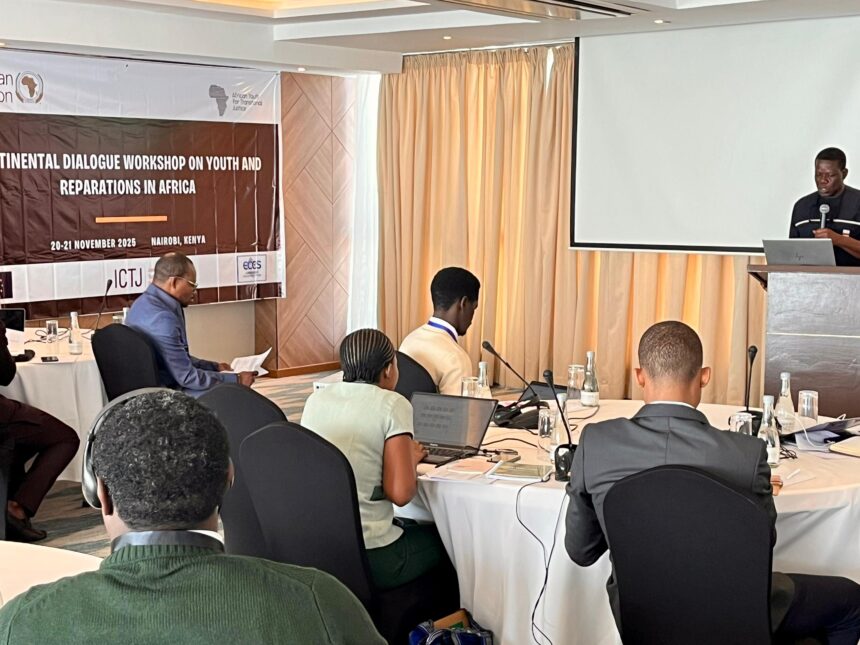The African Union has urged young people across the continent to take a technical leadership role in shaping Africa’s peace, justice, and reparations agenda.
This call was made at the opening of a two-day continental dialogue workshop on Youth and Reparations in Africa, which kicked off on Thursday, November 20.
The workshop will until November 21, in Nairobi, Kenya.
The event is organized by the AU Commission’s Department of Political Affairs, Peace and Security (AUC-DPAPS).
The workshop is part of the AU’s ongoing push to build capacity of members of the African Youth for Transitional Justice, AY4TJ, platform—launched in 2024 to ensure that youth and not only participate but also influence the design and implementation of transitional justice initiatives.
Through this platform, the AU aims to strengthen youth capacity, embed youth- and gender-sensitive approaches in national processes, and position young Africans as key contributors to policy and decision-making.
AY4TJ chairman, Eyan Echeng, highlighted the progress the platform had already achieved, including the development of five policy briefs in partnership with Impunity Watch.
He encouraged participants to stretch their thinking, confront biases, and approach transitional justice from a bold, youth-driven perspective.
He also commended the AU Transitional Justice Unit and Program Coordinator, Mr. Usani Odum, for their strategic support.
Speaking at the opening, the Head of the AU Transitional Justice Unit, Dr. Ikubaje John, praised the rapid achievements of the youth platform.
However, he issued a strong challenge: young people must increase their technical engagement in transitional justice processes across Africa.
Citing active national processes in countries such as South Sudan and upcoming initiatives in Lesotho, he called on youth to draft position papers and propose concrete models for mainstreaming youth participation.
In his keynote address, Mr. Usani Odum explored the theme: “Unpacking Reparations under the AUTJP: Advancing Reparative Justice Independent of Accountability and Truth-Telling Processes.”
He argued that African states must not delay reparations for victims of gross human rights violations while waiting for truth commissions or accountability mechanisms that often face political resistance.
He cited two instances in Africa where reparation was done as a standalone process of transitional justice.
First is the reparation for the victims of Kenya’s 2007/2008 post-election violence, and DRC’s National Reparation Fund, FUNAREF, for survivors of sexual violence.
Drawing example from Liberia, he emphasized that transitional justice is highly political, and when truth commissions and accountability process face resistance or collapse, reparation also suffers the same fate leaving the victims with nothing.
Usani recommended practical steps calling on states to establish interim reparative programs, create national reparation authorities, set up victim registration, explore symbolic community reparation initiatives such as Mozambique’s spirit cleansing, and establish sustainable national reparation funds.
Discussions following the keynote reinforced the need for victim-centered, context-specific transitional justice.
Dr. John revisited a question raised during an earlier AU forum for African Women for Transitional Justice: why are African youth sometimes clog in the wheel of transitional justice?
Usani attributed this to the securitization of issues involving youth, noting that they are frequently portrayed as threats rather than partners.
Echeng added that if youth can be mobilized to take up arms during conflict, they should equally be empowered to lead peace efforts.
Panel sessions further explored insights from AY4TJ policy briefs and highlighted the importance of strengthening youth capacity in technical skills, resource mobilization, and innovative advocacy—including leveraging digital tools, art, and music for memorialization and public engagement.
The workshop continues till November 21, with technical sessions aimed at refining a clear, youth-driven roadmap for reparative justice in Africa—underscoring the AU’s message that young Africans must not only have seats at the table but take leading roles in shaping the continent’s transitional justice future.
READ ALSO:
20% of world’s children trapped in extreme poverty -UNICEF
Kebbi girls: Tinubu directs defence minister to relocate to state
NIS, NIMC state reasons for need to work more closely
BREAKING: IPOB leader, Kanu, sentenced to life imprisonment
Police arrest man for allegedly killing wife, hiding corpse in sack
Judgement day: Judge orders Kanu out of court for being unruly














